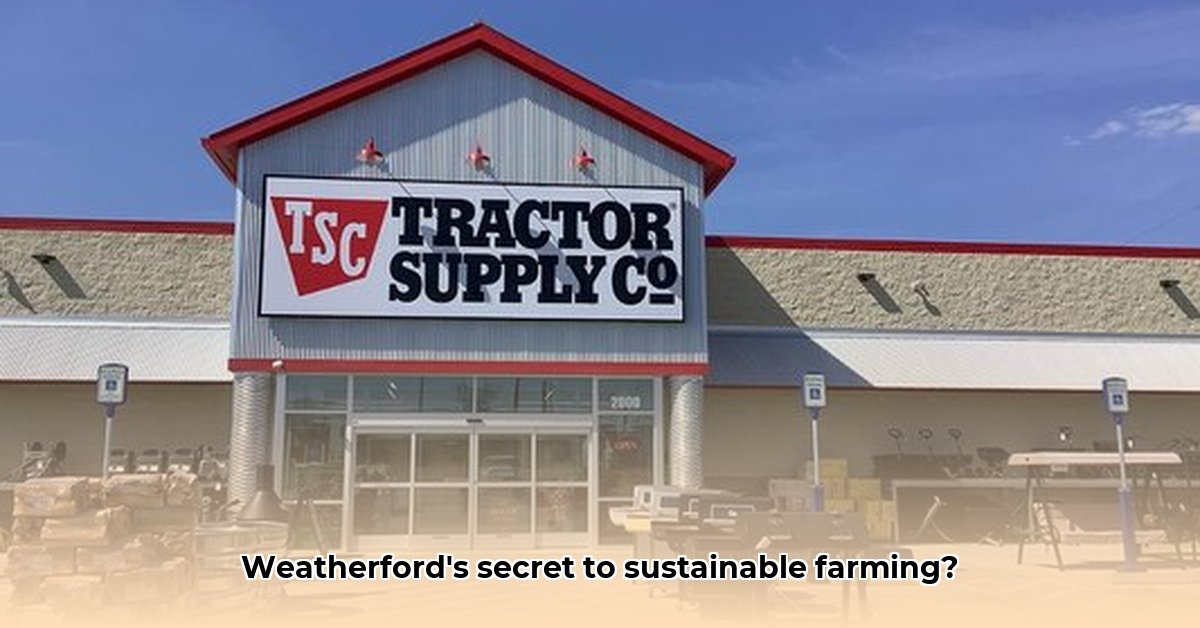
Tractor Supply's Role in Weatherford's Sustainable Agriculture
Tractor Supply Company (TSC) in Weatherford, Oklahoma, serves as more than just a retail outlet; it functions as a vital community resource quietly supporting local farmers and gardeners committed to environmentally conscious agricultural practices. This article explores TSC's contribution to sustainable farming in Weatherford, examining its product offerings, highlighting local success stories, and addressing the need for greater transparency in its supply chain. Learn more about the Weatherford store at this link.
The accessibility of TSC's resources is a significant factor in promoting sustainable agriculture within the community. Imagine the challenges faced by rural residents needing specialized organic seeds or fertilizers – the hours spent driving to distant suppliers. TSC eliminates this obstacle, empowering Weatherford residents to make sustainable choices without significant inconvenience. This convenient access is a crucial element in enabling and encouraging the adoption of environmentally friendly farming practices. How many local farmers, we wonder, would adopt organic practices without such readily available resources?
TSC's Product Offerings and Local Impact
TSC's Weatherford store stocks a surprising array of products beneficial to sustainable farming. Beyond the expected tools and equipment, they offer organic seeds and compost, water-efficient irrigation systems, and even tools crafted from recycled materials. This blend of traditional farming essentials and newer sustainable options makes the store a one-stop shop for environmentally conscious producers.
This accessibility translates into tangible results. Consider Sarah, a Weatherford resident who relies on TSC's organic seed selection to cultivate a thriving vegetable garden, thereby reducing her dependence on conventionally grown, often long-distance transported, produce. Similarly, John, a local rancher, sources sustainable livestock feed from TSC, contributing to the well-being of his animals while minimizing his environmental footprint. These anecdotal examples illustrate the real-world impact of TSC's readily accessible sustainable offerings. They showcase how increased access to environmentally friendly resources directly impacts farming practices.
Addressing the Challenges: Transparency and Supply Chain Sustainability
While TSC's contribution to sustainable agriculture in Weatherford is evident, a critical challenge remains: the lack of comprehensive information regarding the sustainability of its entire supply chain. Currently, detailed data on the sourcing of products like feed and seeds is limited. Understanding the environmental standards employed throughout the production process is crucial for a complete assessment of TSC's overall environmental impact. Professor Emily Carter, renowned sustainability expert at Princeton University, highlights this need: "Transparency is paramount in evaluating the true sustainability of any supply chain. Without complete data, the environmental impact remains largely unknown."
TSC's Potential and a Path Forward
Despite these data limitations, TSC's potential positive impact is substantial. By supplying sustainable alternatives, the store indirectly facilitates local food production, reducing reliance on often less sustainable industrial agriculture. This increased local food production likely enhances community resilience, providing greater control over food sources.
To further amplify this positive impact, several key steps are necessary:
TSC Supply Chain Transparency: TSC should conduct a comprehensive audit of its entire supply chain. Publicly releasing a detailed sustainability report, transparently detailing sourcing practices and environmental impact metrics, would build consumer trust and encourage industry-wide improvements.
Farmer and Gardener Engagement: Local farmers and gardeners can maximize the use of TSC's sustainable resources by adopting environmentally friendly practices such as organic farming, water-wise irrigation, and integrated pest management. Actively advocating for policies supporting sustainable agriculture will further amplify the positive impact.
Community Action: The Weatherford community can strengthen local food systems by prioritizing purchases from local farmers' markets and farms. Supporting community gardens and promoting educational programs focused on sustainable living practices are essential for community-wide engagement.
Research and Data Collection: Further research is needed to quantify TSC's indirect contribution to sustainable agriculture in Weatherford. Development of robust metrics to measure the effectiveness of TSC's products in promoting sustainable farming practices would provide valuable data for future improvements.
The journey toward a truly sustainable agricultural system necessitates collaboration. By improving transparency, making conscious choices, and fully engaging the community, Weatherford can build a healthier and more resilient environment. Tractor Supply, in its own quiet way, plays a significant role in this journey—a role that can be amplified through concerted action from all stakeholders. The future of sustainable agriculture in Weatherford depends on this collective effort.